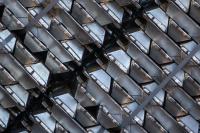RUSAL introduces next generation of one of the most in-demand products – MaxiFlow 2.0
RUSAL, one of the world's largest aluminium producers, has successfully completed development and began field-scale tests of a new generation of MaxiFlow billets, version 2.0. This innovation will enable RUSAL's customers to significantly increase extrusion speed and overall production efficiency. The predecessor of this new product – MaxiFlow 1.0 – has already become one of the most in-demand products within RUSAL's product line.
MaxiFlow 2.0 is the next generation of High Speed 6000 series heat treatable Al-Mg-Si extrusion alloys, aimed at delivering superior productivity benefits over the initial Maxiflow. It was developed by RUSAL's proprietary research centre: The Institute of Light Materials and Technologies (ILM&T). The homogenization process underwent further refinement, resulting in a more ductile metal microstructure. This enhancement enabled an additional increase in extrusion speed by 10%-15%, providing a substantial advantage cost-wise. This will drastically improve the process efficiency and productivity for RUSAL customers and enhance their competitiveness.
“The predecessor of the new product, MaxiFlow, was introduced to the market by RUSAL in 2019. MaxiFlow ingots combine the fastest possible extrusion process with high strength that meets international standards such as ASTM and EN. Compared to the standard line of 6000 series alloys, MaxiFlow has allowed RUSAL customers around the world - from Taiwan and Russia to Turkey, Germany and Italy - to increase extrusion speed by 10-25%. This speeds up the production process and allows to resolve bottlenecks within the process chains,” said Technical Director of RUSAL, Victor Mann.
According to Dmitry Ryabov, Director of Science at The Institute of Light Materials and Technologies, "The enhanced features of MaxiFlow 2.0 are primarily achieved through optimized heat treatment technology, alongside specialized chemical composition. The development of MaxiFlow 2.0 took about a year. The results of laboratory-scale and field-scale tests validated the product’s specified performance. Field-scale testing is scheduled for completion by the end of 2024, paving the way for its commercial launch.
The financial gain to customers from using MaxiFlow, compared to the standard line of billets, ranges from 30 to 70 Euros per tonne of metal. The product has quickly become one of RUSAL's most sought-after offerings: the compound annual growth rate of sales from 2019 to 2023 maintained an impressive rate of over 60%. Currently, MaxiFlow accounts for over 70% of all RUSAL billet production volume. Europe has emerged as the forefront region in leveraging the provided benefits, bolstering both its domestic and international business ventures.
Each MaxiFlow customer receives full technical support from RUSAL to help maximize productivity. Since 2019, over half a million tons of MaxiFlow billets have been supplied to extrusion manufacturers worldwide, from Taiwan and Russia to Türkiye, Germany and Italy. Designed for diverse end-use industries, MaxiFlow alloys have, enhanced the production efficiency of profiles for windows and doors, structural components for the automotive sector, and decorative constructions in architecture, among others. In particular, MaxiFlow billets meet the needs of the fast-growing industries such as frames for solar panels and battery trays for electric vehicles.
MaxiFlow billets, made of ALLOW metal, incorporates an additional benefit of a low carbon footprint. RUSAL undergoes an independent audit of aluminium’s carbon footprint, which, combined with the company’s sustainability certifications, ensures transparency of supplies throughout the entire production chain. RUSAL’s commitment to sustainability is underscored by its high ESG ratings, including the A-CDP climate rating from the Carbon Disclosure Project, highlighting the company’s dedication to the green economy.

Комментарии могут оставлять только зарегистрированные (авторизованные) пользователи сайта.